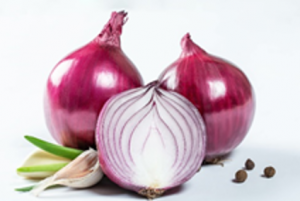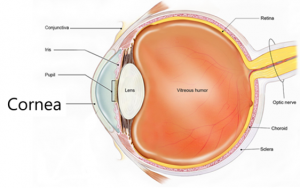By Devina Thiono 
Onions are some of the most useful and tasty ingredients a chef can use. When you cut into them, however, you may notice that your eyes start to burn and tear. It might even get so bad that you have to step away and ask someone else to finish the cutting! As annoying as the burning and tearing can be, the science behind why onions make us cry is actually really fascinating.
Onions contain an organic chemical called isoalliin and an enzyme called alliinase. When the onion is just sitting on the counter, the two molecules do not interact. When the onion is cut, however, its cells break apart and a series of chemical reactions occurs that make us teary. First, isoalliin and alliinase are able to meet and interact, producing sulfenic acid. Slfenic acid is then processed by lachrymatory factor synthase (LFS), which results in the production of lachrymatory factor (LF, see figure below).
LF is a lachrymator. The word “lachrymator” is derived from the Latin term lacrima, which means tear. Living up to its name, any substance that is categorized as a lachrymator can irritate the eyes and cause them to tear. LF is a gas that readily spreads to its surroundings, including into our eyes! When LF reaches our eyes, we feel a burning sensation. Our tear glands then reflexively produce tears, to ease the irritation.
However, there is nothing personal about onions hurting us! Onions produce LF to defend themselves from other animals/insects while they are buried and growing underground. Unfortunately, this also means that the onions are trying to protect themselves from us.
 Scientists are attempting to make tearless onions that taste the same as the “real” onions we’re used to. Until then, some people have proposed we wear goggles when chopping onions, or to refrigerate them ahead of time. There is also evidence that wearing contact lenses can help, too. Contact lenses lie on the cornea, where a lot of sensory nerve fibers are found. These nerve fibers are responsible for processing information – warning our eyes of irritants (LF) – and, eventually, causing our tear glands to produce tears. Similar to goggles, contact lenses help to prevent LF from directly contacting sensory nerve fibers in the cornea. Regular glasses may not prevent LF from reaching our eyes as well as goggles/contact lenses due to the gap between our eyes and the glasses. Personally, I use a food processor or oftentimes just prepare myself mentally before chopping onions and remind myself of the end rewards. So, the next time you find yourself or a friend crying over an onion, take a moment to think of how cool the science behind this reaction really is!
Scientists are attempting to make tearless onions that taste the same as the “real” onions we’re used to. Until then, some people have proposed we wear goggles when chopping onions, or to refrigerate them ahead of time. There is also evidence that wearing contact lenses can help, too. Contact lenses lie on the cornea, where a lot of sensory nerve fibers are found. These nerve fibers are responsible for processing information – warning our eyes of irritants (LF) – and, eventually, causing our tear glands to produce tears. Similar to goggles, contact lenses help to prevent LF from directly contacting sensory nerve fibers in the cornea. Regular glasses may not prevent LF from reaching our eyes as well as goggles/contact lenses due to the gap between our eyes and the glasses. Personally, I use a food processor or oftentimes just prepare myself mentally before chopping onions and remind myself of the end rewards. So, the next time you find yourself or a friend crying over an onion, take a moment to think of how cool the science behind this reaction really is!

